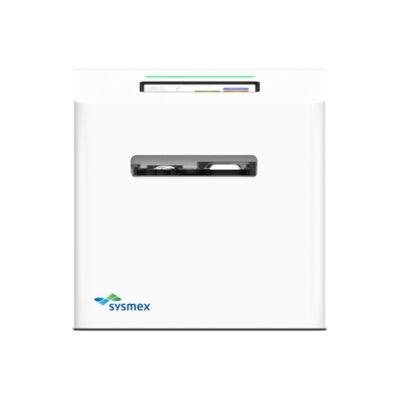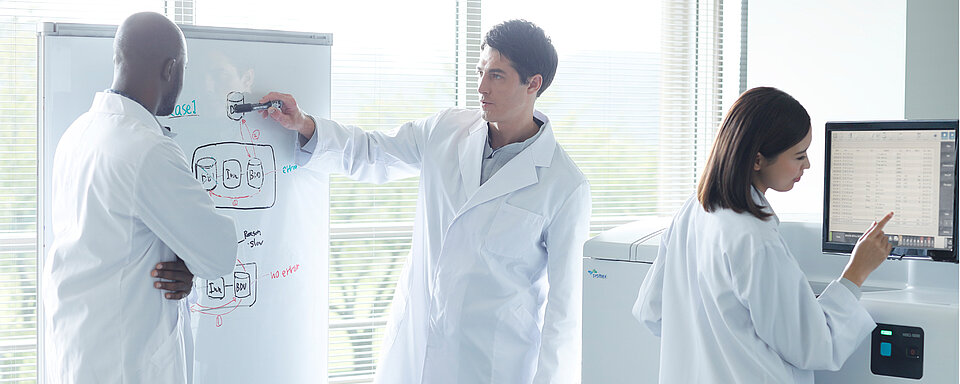Sysmex Europe launches a testing system ("the System") in Europe for rapid detection of antimicrobial susceptibility. The System detects the presence or absence of bacteria and assesses the effectiveness of antimicrobials using urine samples from patients suspected of having urinary tract infections (UTIs)1. Using a unique and proprietary microfluidic technology, 2 the System delivers antimicrobial susceptibility testing (AST)3 results in as little as 30 minutes from the start of measurement, a significant reduction compared to the several days required for conventional AST. The System not only promotes proper use of antimicrobial drugs in primary care settings, which are often the first point of contact for patients, but also contributes to the fight against antimicrobial resistance (AMR), 4 a global challenge that requires concerted action.
Proper diagnosis and timely use of effective antimicrobials are of crucial importance in the treatment of bacterial infections, such as UTIs. In recent years, the COVID-19 pandemic has pushed clinical testing for infection diagnosis closer to patients, who often receive such testing at local clinics. Unfortunately, it was not possible to prescribe antimicrobials based on the AST results during the initial patient encounter, as traditional AST methods can take several days to deliver results. This delay can contribute to the emergence of AMR. The emergence of AMR reduces patients’ access to effective antimicrobial treatments, which not only worsens their condition and reduces their quality of life (QOL) but also leads to serious economic consequences such as escalating medical costs due to prolonged hospital stays and the use of expensive drugs. This underscores the urgent global need to promote proper antimicrobial use in healthcare.5
The System, comprising a compact desktop-sized analyzer and sample cartridges, can automatically detect the presence or absence of bacteria in urine samples from patients suspected of having UTIs usually within 15 minutes and can perform AST to assess the effectiveness of various antimicrobials against any detected bacteria in as little as 30 minutes from the start of measurement. This assists the appropriate use of antimicrobials during initial patient visits at clinics and other primary care settings. By employing a unique and proprietary microfluidic technology developed by Sysmex Astrego, which became an entirely owned subsidiary of Sysmex in May 2022, the System delivers significantly faster results in determining the effectiveness of antimicrobials than traditional AST methods, which can take several days to culture bacteria and assess their susceptibility to different drugs. Furthermore, the System is user-friendly; directly placing a sample on the reagent cartridge and inserting the cartridge into the analyzer allows the device to automatically perform all the necessary measurements. It can be easily operated by healthcare professionals without specialized laboratory testing expertise.
The System will initially be introduced in the European market to raise awareness and gather evidence of its clinical usefulness before eventually expanding to other regions and broadening the range of applicable diseases.
This testing technology has the potential to revolutionize traditional clinical workflows for infectious diseases and address unmet medical needs for infection diagnosis. Sysmex is dedicated to tackling the global threat of AMR by making this innovative technology accessible to a wide range of primary care settings.
Product Overview
| Product name | PA-100 AST System |
| Intended use | To perform bacteria detection and antimicrobial susceptibility testing directly from urine samples of patients suspected of having UTIs *The System is used for in vitro diagnostic use by healthcare professionals in near-patient testing (NPT)6 |
| Manufactured by | Sysmex Astrego AB |
| Target market | Europe (to be expanded to other regions following regulatory approval) |
| Launch | June 2023 |
References
May 2, 2022 news release: “Astrego Diagnostics AB Becomes Wholly-owned Sysmex Subsidiary through the Acquisition of Outstanding Shares – Commercialization of Rapid Antimicrobial Susceptibility Test to Reinforce Structure for Promoting AMR Countermeasures –” https://www.sysmex.co.jp/en/news/2022/pdf/220502.pdf
November 18, 2022 stories: “Tackling the Universal Threat of Antimicrobial Resistance (AMR) with New Testing Technology – Sysmex Group Working Together in Efforts to Meet This Social Challenge –“ https://www.sysmex.co.jp/en/stories/221118.html
Terminology
- Urinary tract infections (UTIs):
UTIs are caused by bacteria that proliferate in the urinary tract, spanning from the kidneys to the urinary outlet, resulting in inflammation. These infections can lead to cystitis in the bladder and pyelonephritis in the kidneys. They are among the most commonly encountered bacterial infections in daily clinical practice, with approximately 60% of women experiencing this at least once in their lifetime.
*Source: American Urological Association Website “Urinary Tract Infections in Adults” https://www.urologyhealth.org/urology-a-z/u/urinary-tract-infections-in-adults (Ref. 2023-06-20)
- Microfluidic technology:
Sysmex Astrego's unique and proprietary technology involves creating microchannels at the micrometer or nanometer level, which allows individual bacteria from a fluid sample to be captured and cultured unidirectionally within these microchannels, enabling rapid detection of antimicrobial susceptibility. https://www.sysmex-astrego.se/technology.html
- Antimicrobial Susceptibility Testing (AST):
This test examines the effectiveness of various antimicrobials against bacteria detected in samples.
- Antimicrobial Resistance (AMR):
AMR occurs when microorganisms develop mechanisms that protect themselves from the effects of drugs, making the drugs less effective or completely ineffective. Bacteria that have acquired such resistance are referred to as drug-resistant bacteria.
- If no efforts are made to address AMR, it is estimated that drug-resistant bacteria could cause the deaths of more than 10 million people per year globally by 2050, exceeding the number of deaths from cancer.* The fight against AMR has been accelerated by adopting a 'global action plan on antimicrobial resistance' at the World Health Assembly in May 2015.
*Source: Antimicrobial Resistance: Tackling a crisis for the health and wealth of nations. The Review on Antimicrobial Resistance, Chaired by Jim O’ Neill. December 2014 https://amr-review.org/sites/default/files/AMR%20Review%20Paper%20-%20Tackling%20a%20crisis%20for%20the%20health%20and%20wealth%20of%20nations_1.pdf
- Near-patient Testing (NPT):
NPT (sometimes called Point-of-Care Testing or POCT) is a generic term for a series of clinical testing processes conducted by healthcare professionals close to or near the patients, such as those in clinical or nursing settings. Its advantages include the rapid delivery of results and increased transparency for patients.
Sysmex’s Materiality
Sysmex has identified the Creating new value for a healthy society” as one of the issues that we prioritize (materiality), and we are working toward the resolution of medical issues through innovation. Through various collaborations, we aim to offer new value to make each individual's healthcare journey better and grow as an essential presence in society.



